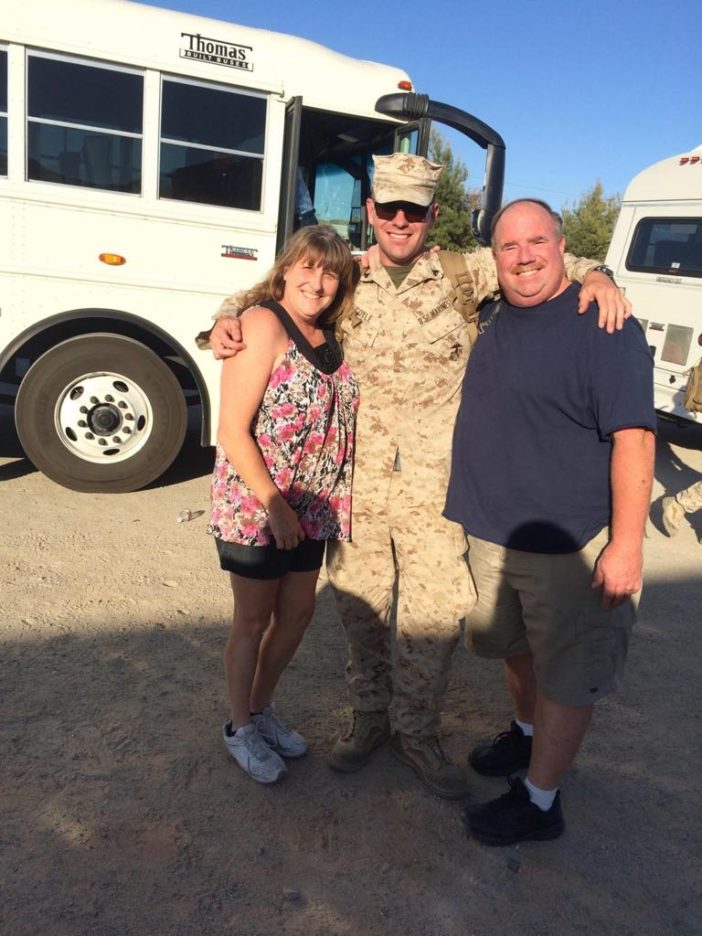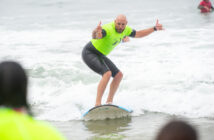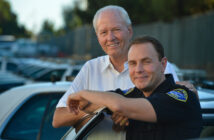“I’m going to a country that starts with an ‘I’,” the 22-year-old told his father.
Dennis Coyle felt sick. And scared.
“He was stationed in Kuwait so I knew he didn’t mean Ireland,” said the La Habra Police Animal Control Officer and Chaplain. “He was headed to Iraq.”
Coyle said he is not one to cry, but that day in November 2014, the day before Thanksgiving, he might have shed a few tears.
“For me, that’s when it got really real,” he said. “It wasn’t easy.
“If they wanted to send me, I would have gone in a heartbeat but I thought, ‘You’re going to take my boy?’”
When his son, Josiah Coyle, joined the Marine Corps two years ago he didn’t think about the possibility his only son may be called to a war zone.
“Before he enlisted he told me, ‘I can’t move forward without doing this,’” Coyle said. “It didn’t really hit me until he got deployed.”
After Josiah Coyle served more than a year with the Marines, including a little more than two months in Kuwait, the phone call came in hinting he would be heading to Iraq.
All the unknowns of his son’s deployment weighed heavy on Coyle and his wife in every aspect of their lives — including work.
Two of Coyle’s former Marine colleagues at La Habra PD, including Cpl. Scott Irwin, reached out.
“They knew what was going on with my son,” Coyle said. “I guess they saw it in my face and in my demeanor.”
Coyle was encouraged to participate in the department’s Peer Support program — something the chaplain was intimately familiar with because he, too, serves as a counselor.
He just never expected to be on the other side.
…
LHPD started the program about two years ago to help police employees seek support after any kind of trauma or emotional stress, said Irwin, who helped develop the program.
“The bottom line is the welfare of employees’ mental health,” Irwin said. “We are faced daily with different traumatic events.”
An officer firing his or her weapon, a baby-not-breathing call or a gruesome fatal accident scene are the kinds of things officers may need help to get through.
“In the past, there wasn’t a whole lot of focus on this,” Irwin said. “You went through your ordeal, you dealt with it and you went on your way.”
A dispatcher fielding emotionally charged phone calls with a person contemplating suicide or threatening violence on a victim take their toll just the same.
“I think sometimes it’s even more difficult for dispatchers,” Irwin said. “They’re sitting behind a screen and all they hear is a radio and they can’t go out there and help.”
Today, La Habra Police see the importance of providing a confidential outlet for their officers, dispatchers and civilian employees to talk about the tough part of their jobs.
“In that situation, not everybody is going to want to talk about what they’re going through” said Sgt. Jose Quirarte, Irwin’s supervisor and supervisor of the department’s chaplain program (he is not a peer supporter). “It’s learning how to listen, learning how to be faced with a problem and trying to get that person to a point where they’re able to deal with it.”
Counselors go through training to learn how to handle various types of situations in strict confidence.
Before Peer Support, police employees who went through a traumatic event were offered short-term help from a psychiatrist before returning to work.
While Peer Support offers referrals to mental health services for those who want or need them, what makes the program so successful is the fact those who are giving the counseling have first-hand knowledge of what that officer, dispatcher or civilian employee is going through, Irwin said.
“The best way I can describe it is we are all in this together,” he said. “If we show each other support, it makes the job a lot easier.”
And Peer Support is not restricted to on-the-job issues. Employees, like Coyle, facing emotional struggles outside of work can seek help, too.
“With Peer Support what’s nice is you’re dealing with people who understand what you’re talking about,” Coyle said. “You can open up and talk to them.”
…
In Coyle’s case, seeking help from former-Marines in the department helped calm his fears, even if only slightly, while his son was deployed.
They were able to explain how things work and even help him narrow down where Josiah was stationed, since the Marine couldn’t disclose his location, Coyle said.
The limited times Coyle spoke with his son he asked a lot of questions.
Do the lights blind out the stars? Does it smell badly?
When the answer was ‘no’, Coyle knew his son was not stationed near a big city.
What was the temperature like? Is it hilly or flat?
Eventually, Coyle and his Peer Support counselors were able to figure out his son’s location with near-certainty.
“My wife didn’t want to know where he was, but for me that was all I wanted to know,” Coyle said. “It helped.”
Peer Support was also there when Coyle had to experience his family’s first Thanksgiving and Christmas without their son. The couple and their two daughters also missed celebrating Josiah’s birthday for the first time.
“That was tough,” Coyle said.
Then, one day in April, Coyle walked the halls of the La Habra Police Department and seemed lighter, happier.
His Peer Support colleagues who’d been helping him along took notice.
They said, “‘Your demeanor looks totally different.’ I told them, ‘I just got a phone call two hours ago — my son is out of Iraq,” Coyle said. “I guess you don’t notice how you look on the outside.”
“I definitely got more gray hairs during his deployment.”
Josiah Coyle is now back in the US and stationed at Twentynine Palms in San Bernardino County.
Coyle is thankful to have his son home and said he is grateful for the LHPD program that helped him get through an emotionally trying seven months.
“Here I am, a part of the program itself, and I know what the benefit is,” Coyle said. “But now, I have experienced what the benefit is.”
 Behind the Badge
Behind the Badge



